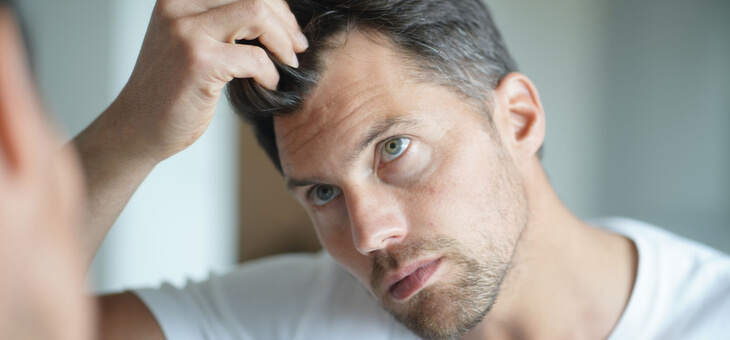Hair loss is one of the more commonly experienced drawbacks of ageing, and can also be one of the most stressful. But knowing the obvious and not so obvious reasons for losing hair could be the key to lessening your risk or being able to do something about it.
We don’t really like to talk about losing our hair, because of the distress it causes. It’s incredibly common, with a majority of Australian men experiencing some degree of hair loss by the age of 50. Although it is far more common in men, hair loss affects around 5 per cent of women too – usually later in life.
Hair loss comes in many forms. There are both male and female types of pattern baldness, where hair thins in a predictable pattern as we age.
Medical conditions such as alopecia areata are a common reason to start losing hair and, in women, polycystic ovary syndrome has been known to thin hair.
Read: How you can stop hair loss
The reason your hair is thinning, whatever the initial cause, is because the hair follicles have become damaged and are no longer able to produce replacement hair when old hair falls out naturally.
The most common cause of hair loss is your genetics. If you have a family history of baldness on either side, then you are most at risk of thinning. Contrary to old wives’ tales, it’s not just your mother’s side that passes down the baldness gene. It can be inherited from both the mother and father’s side just as easily.
Genetics aside, there are numerous other factors that can contribute, including stress, illness, medication and certain hair treatments.
Finding more than the usual number of hairs on your pillow or finding it clogging up the drain in the shower is enough to upset anyone. But if you have no family history of hair loss and aren’t particularly stressed or sick, what’s happening?
Here are a number of lesser-known causes:
Read: Data shows Aussies ‘alarmingly complacent’ about exercise
Lack of vitamin D
Vitamin D deficiency is the culprit in a number of health problems, including osteoporosis and liver and kidney disorders. Although vitamin D can be found in many foods such oily fish or mushrooms, humans get the majority of their vitamin D from direct exposure to sunlight.
Low levels of vitamin D can lead to hair loss, usually temporary, but in some cases permanent.
“We know that vitamin D is very important for the hair follicle and therefore hair growth,” says dermatologist Dr Raechele Cochran Gathers.
“In fact, vitamin D is one of the fat-soluble vitamins needed for maintaining and creating functioning hair follicles.”
Make sure you get plenty of time in the sun to soak up that nourishing vitamin D and keep your follicles healthy.
Read: Do you suffer from hypothyroidism? You may not even know it
Too much exercise
Finally, a problem that can’t be solved by exercising! In fact, pushing your body too far and not taking enough time to let it recover can have disastrous effects on your hair.
“Excessive exercise and a lack of nutrition can lead to premature hair loss,” hair restoration expert Dr James Marotta says.
“Over a long period, too much exercise can cause your body to enter a chronic state of stress, which in turn leads to a condition called telogen effluvium. This causes your hair follicles to go dormant, when they would otherwise continue to grow.”
Clearly, exercise has many health benefits, just don’t overdo it.
Thyroid issues
Trouble with your thyroid gland, located in your throat, is linked to myriad issues including excessive fatigue, weight loss or gain and depression. There is also evidence that an underactive thyroid can have a devastating impact of your hairline. Hair loss is listed as one of the symptoms of hypothyroidism by the Australian Thyroid Foundation.
According to a study, the thyroid sends hormonal signals to hair follicles that are crucial to their functioning. If you have an underactive or overactive thyroid it can result in these signals not getting through and the follicle dying.
Thyroid problems can be hard to diagnose and manifest in a wide variety of symptoms, including hair loss. Other symptoms could be extreme fatigue, weight gain, sleep disturbance, increased sensitivity to cold and breathlessness.
It can be hard to nail the thyroid down as being the culprit for your hair loss, but if you’re noticing thinning in conjunction with some of the other symptoms, then it may be worth getting checked out.
Have you noticed your hair starting to thin? Do any of these increased risk factors apply to you? Let us know in the comments section below.
If you enjoy our content, don’t keep it to yourself. Share our free eNews with your friends and encourage them to sign up.
Health disclaimer: This article contains general information about health issues and is not advice. For health advice, consult your medical practitioner.

